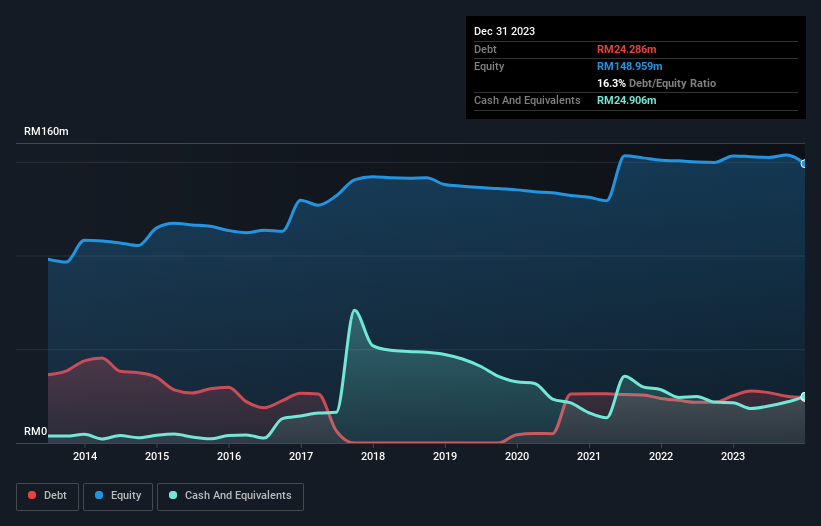Stock Analysis

Warren Buffett famously said, 'Volatility is far from synonymous with risk.' When we think about how risky a company is, we always like to look at its use of debt, since debt overload can lead to ruin. We can see that Parkwood Holdings Berhad (KLSE:PARKWD) does use debt in its business. But should shareholders be worried about its use of debt?
Why Does Debt Bring Risk?
Generally speaking, debt only becomes a real problem when a company can't easily pay it off, either by raising capital or with its own cash flow. If things get really bad, the lenders can take control of the business. However, a more frequent (but still costly) occurrence is where a company must issue shares at bargain-basement prices, permanently diluting shareholders, just to shore up its balance sheet. Of course, the upside of debt is that it often represents cheap capital, especially when it replaces dilution in a company with the ability to reinvest at high rates of return. When we examine debt levels, we first consider both cash and debt levels, together.
Check out our latest analysis for Parkwood Holdings Berhad
How Much Debt Does Parkwood Holdings Berhad Carry?
The chart below, which you can click on for greater detail, shows that Parkwood Holdings Berhad had RM24.3m in debt in December 2023; about the same as the year before. But on the other hand it also has RM24.9m in cash, leading to a RM620.9k net cash position.

How Healthy Is Parkwood Holdings Berhad's Balance Sheet?
According to the last reported balance sheet, Parkwood Holdings Berhad had liabilities of RM10.1m due within 12 months, and liabilities of RM23.5m due beyond 12 months. Offsetting these obligations, it had cash of RM24.9m as well as receivables valued at RM5.86m due within 12 months. So its liabilities total RM2.83m more than the combination of its cash and short-term receivables.
Of course, Parkwood Holdings Berhad has a market capitalization of RM41.3m, so these liabilities are probably manageable. However, we do think it is worth keeping an eye on its balance sheet strength, as it may change over time. Despite its noteworthy liabilities, Parkwood Holdings Berhad boasts net cash, so it's fair to say it does not have a heavy debt load! When analysing debt levels, the balance sheet is the obvious place to start. But it is Parkwood Holdings Berhad's earnings that will influence how the balance sheet holds up in the future. So when considering debt, it's definitely worth looking at the earnings trend. Click here for an interactive snapshot.
In the last year Parkwood Holdings Berhad wasn't profitable at an EBIT level, but managed to grow its revenue by 49%, to RM27m. With any luck the company will be able to grow its way to profitability.
So How Risky Is Parkwood Holdings Berhad?
Although Parkwood Holdings Berhad had an earnings before interest and tax (EBIT) loss over the last twelve months, it generated positive free cash flow of RM7.5m. So taking that on face value, and considering the net cash situation, we don't think that the stock is too risky in the near term. The good news for Parkwood Holdings Berhad shareholders is that its revenue growth is strong, making it easier to raise capital if need be. But that doesn't change our opinion that the stock is risky. There's no doubt that we learn most about debt from the balance sheet. But ultimately, every company can contain risks that exist outside of the balance sheet. Case in point: We've spotted 2 warning signs for Parkwood Holdings Berhad you should be aware of.
When all is said and done, sometimes its easier to focus on companies that don't even need debt. Readers can access a list of growth stocks with zero net debt 100% free, right now.
Valuation is complex, but we're helping make it simple.
Find out whether Parkwood Holdings Berhad is potentially over or undervalued by checking out our comprehensive analysis, which includes fair value estimates, risks and warnings, dividends, insider transactions and financial health.
View the Free AnalysisHave feedback on this article? Concerned about the content? Get in touch with us directly. Alternatively, email editorial-team (at) simplywallst.com.
This article by Simply Wall St is general in nature. We provide commentary based on historical data and analyst forecasts only using an unbiased methodology and our articles are not intended to be financial advice. It does not constitute a recommendation to buy or sell any stock, and does not take account of your objectives, or your financial situation. We aim to bring you long-term focused analysis driven by fundamental data. Note that our analysis may not factor in the latest price-sensitive company announcements or qualitative material. Simply Wall St has no position in any stocks mentioned.
About KLSE:PARKWD
Parkwood Holdings Berhad
Parkwood Holdings Berhad engages in the development and management of properties in Malaysia.
Excellent balance sheet and good value.

